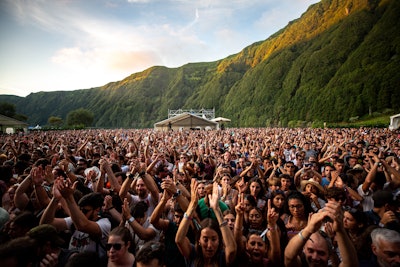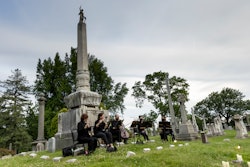
AZORES, PORTUGAL—About 17 years ago, Nuno Bettencourt—a Portuguese-American and Grammy-nominated artist, songwriter, and producer most known for his time with the band Extreme—was exploring Sete Cidades, a pristine, three-mile volcanic crater in the middle of the Atlantic Ocean in his birthplace of Azores, Portugal.
While walking across a bridge that separated the crater’s two lakes, Bettencourt looked around at the space’s ecologically-rich beauty and noticed it created something resembling a natural amphitheater. He turned to a friend and said, “Can you imagine something like Woodstock inside here?" he remembered in a recent interview with BizBash. “Something had always drawn me to that place from the time I was young. It’s just magic.”
Almost two decades later Bettencourt made that big dream a reality with the first-ever Atlantis Concert for Earth, a nonprofit concert and global conservation celebration that took place July 22-23 inside the crater. Yes, inside the remote location that had never before hosted an event of this scale.
The unique, star-studded gathering—which drew a sold-out crowd of 10,000 people—was headlined by the likes of Black Eyed Peas, Pitbull, Stone Temple Pilots, Bush, and Nicole Scherzinger; it also featured virtual performances from Sting and Queen with Adam Lambert, which were livestreamed worldwide for free.  In addition to the performances, the team recruited what Bettencourt refers to as “the rock stars of conservation”—a series of leading conservationists and organizations around the world that are doing solutions-driven work. The groups took to the stage between each set to educate the audience about practical ways they could help the environment.Photo: Rui Pedro Soares
In addition to the performances, the team recruited what Bettencourt refers to as “the rock stars of conservation”—a series of leading conservationists and organizations around the world that are doing solutions-driven work. The groups took to the stage between each set to educate the audience about practical ways they could help the environment.Photo: Rui Pedro Soares
“The last thing anybody needs is just another music festival.”
That quote was Bettencourt’s guiding mantra when building the event, which he worked for over a decade to bring to fruition.
Bettencourt—who also serves as CEO and co-founder of the media, TV, and film production company and record label Atlantis Entertainment—has long had a passion for sustainability and conservation, and has been frustrated that it’s become such a divisive topic. He wanted to use the concert to flip the narrative, and to explore why people were not treating climate change as urgently as they may treat other crises.
“This is basically air, water, and soil, and we all share it,” he pointed out. “We wanted to get away from the doom and gloom—nobody wants to hear that during a football game on Sunday. So we thought, ‘Maybe it’s time to stop telling everyone how we’re all going to die, and start showing them how we’re all going to live.’”  Nuno Bettencourt (left) and Rene M. RigalPhoto: Rui Pedro Soares
Nuno Bettencourt (left) and Rene M. RigalPhoto: Rui Pedro Soares
To do that, Bettencourt added, he quickly realized the concept had to extend far beyond an impressive performer lineup. To help, he enlisted his co-founders, Rene M. Rigal—an award-winning television, film, and content producer and the former chief creative officer of Virgin Produced and president of State Street Pictures—as well as Steven Schuurman, an entrepreneur, philanthropist, and the co-founder of Elastic who made the event possible from a financial standpoint. (The talent lineup was booked by industry veteran Scott Igoe.)
“What Nuno brilliantly said to Steven and I was, ‘We have to take conversations about the climate and make them as emotional and engaging of an experience as when you listen to a song, read your favorite book, watch a movie,” Rigal told BizBash. “It has to be emotional, so people want to find their own passion in the space and their own way to help.”
To highlight that passion, along with practical, palatable solutions that audience members could implement, the team recruited what Bettencourt refers to as “the rock stars of conservation”—a series of leading conservationists and organizations around the world.
The groups were separated into six buckets, centered around topics like forests, wildlife, oceans, energy, and more. (Highlighted organizations were Re:wild, Project InnerSpace, JUCCCE, The Sanctuary, ManHat, Sea Legacy, Blue Azores, The Ocean Cleanup, Earth Percent, Agrea, Agroforestry Regeneration Communities, Cultural Fire, Ecosystem Restoration Camps, Home BioG’s, I Am Water, Food Heroes, Rise and Root Farm, AM, Project DrawDown, Takachar, and Thrst.)
In between each musical performance, the conservationists took to the stage. Working with Rigal and an experienced content team, each group had created their own highly cinematic, three- to five-minute mini-documentary showcasing their work, which they followed with a guest speaker who explained what made them so passionate about their work. Bettencourt described the documentaries as “rock and roll music videos that made people go, ‘That is so cool. How do I get involved in that? I can get my kids and work with a group like that.’”
To extend the impact beyond the in-person audience, the free livestream—hosted on concert streaming service Veeps and produced by Fortress Entertainment Group—had a “click to donate” option. One-hundred percent of donations directly supported the festival’s conservation partners.
“A beautiful balletic chaos.”
Logistically, the team describes the event as, put simply, a “nightmare” due to supply-chain issues, labor shortages, gasoline prices, and the fact that the location was so remote and not an established event venue.
Still, Rigal jokingly refers to the process as a “beautiful balletic chaos.” “There was no playbook on this one,” he explained, adding that being a nonprofit, they couldn’t just throw money at the problems—which led to the team essentially working seven days a week for months. “We had to be super entrepreneurial and just figure it out.”  Sete Cidades is a three-mile-wide volcanic crater located in the middle of the Atlantic Ocean on Portugal's Azores Islands. The 1,600-foot-deep caldera was formed over 22,000 years ago.Photo: Rui Pedro Soares
Sete Cidades is a three-mile-wide volcanic crater located in the middle of the Atlantic Ocean on Portugal's Azores Islands. The 1,600-foot-deep caldera was formed over 22,000 years ago.Photo: Rui Pedro Soares
In a post-Fyre Festival world, though, producers, vendors, and artists alike were understandably hesitant to get on board. For Bettencourt and Rigal, the initial step was getting that first artist to buy in. They leaned into their extensive relationships in the industry, and focused on an emotional approach. They also approached artists who had been vocal about conservation efforts in the past.
“We told them, ‘This is not for me. This is for us. This is for your kids,’” explained Bettencourt. “Whoever you voted for, whatever lifestyle you lead—Earth doesn’t care. Earth is the great equalizer. … Instead of scaring people, let’s inspire them and give them a bit of hope and some actual solutions.”
Once the first artist got on board, he added, people started listening and doors started opening. When COVID struck, the project was further delayed—but through it all, Bettencourt was determined to make it happen as soon as possible. “We looked at each other and thought, 'Is this a really bad idea financially and logistically?' But then we realized—hey, the planet can’t wait anymore. Let’s do what we can right now."
To help, Bettencourt’s brother Luís served as boots on the ground in Portugal, meeting with catering companies, police, the government, farmers, and more.  The Black Eyed Peas (pictured) were one of the first groups to agree to perform. “We told [the performers], ‘This is not for me. This is for us. This is for your kids,’” explained Bettencourt. “Whoever you voted for, whatever lifestyle you lead—Earth doesn’t care. Earth is the great equalizer. … Instead of scaring people, let’s inspired them and give them a bit of hope and some actual solutions.”Photo: Rui Pedro Soares
The Black Eyed Peas (pictured) were one of the first groups to agree to perform. “We told [the performers], ‘This is not for me. This is for us. This is for your kids,’” explained Bettencourt. “Whoever you voted for, whatever lifestyle you lead—Earth doesn’t care. Earth is the great equalizer. … Instead of scaring people, let’s inspired them and give them a bit of hope and some actual solutions.”Photo: Rui Pedro Soares
Ultimately, the team’s biggest concern was going in and destroying this untouched natural environment. They decided early on to partner with A Greener Festival (AGF), a not-for-profit company committed to helping events, festivals, and venues around the world become more sustainable and reduce environmental impacts.
“We said to AGF, 'Police us. Come after us. Tell us what’s wrong, and what we can improve on. And help us build it every year,'” said Bettencourt. “We had them on the ground with us from day one.”
The hybrid gathering ended up being a zero- to low-emission event, and any remaining carbon emissions were calculated, reduced, and, where possible, removed with support from AGF. The teams also produced a 130-page study of how the event would impact the land, and how they could leave it better than it was when they arrived—which proved to be useful when dealing with the local government and community.
What's more, through the AGF and Concert for Earth partnership, a year-two sustainability plan is being created to further reduce environmental impacts for its forthcoming second year in 2023—because yes, the team plans to continue expanding this concept, and has already announced that the second edition will return to Sete Cidades in July 2023.
“I never wanted to feel like we’re a bunch of promoters using Earth as an excuse to throw a concert. It was the other way around,” summed up Rigal, who is excited to keep building on the process in future years. “Earth was the headliner, the conservationists are the rock stars, and the music is the megaphone.”



















